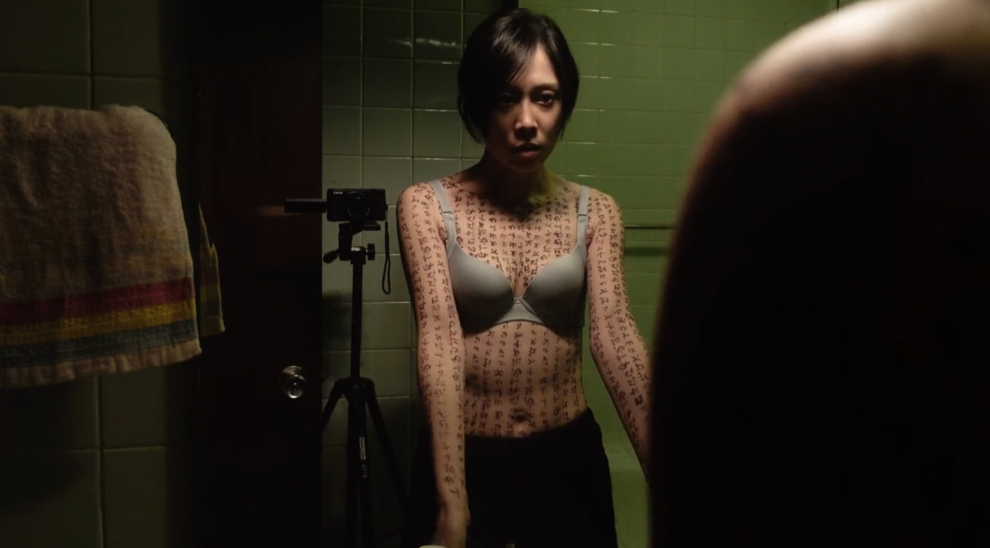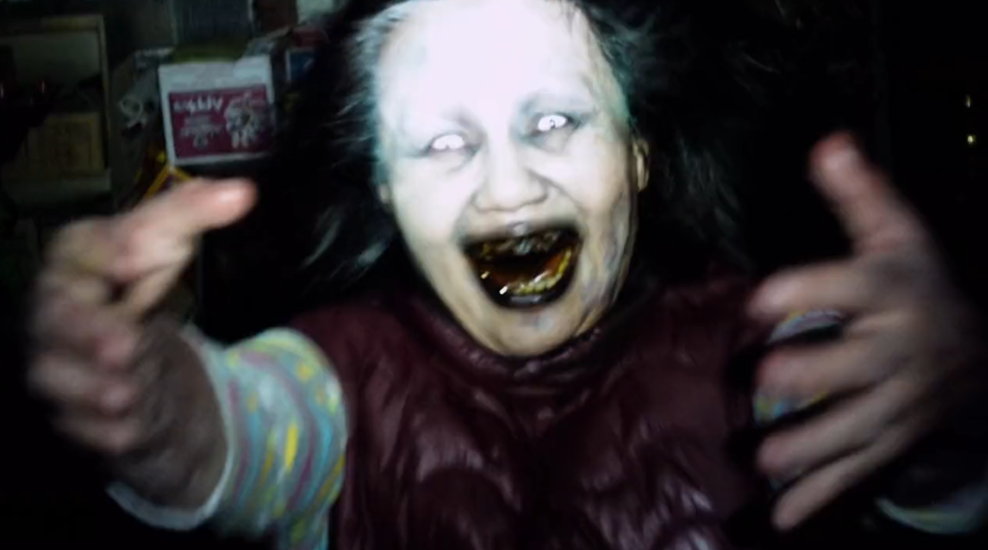[Film Review] Incantation (2022)

Good luck. Drive safe. Fingers crossed.
Well wishes and blessings are not only culturally expected, but are expressed without a second thought, even by those who don’t believe in any form of divine energy. Even your average Atheist will still slip out a ‘bless you’ upon hearing a sneeze. Consciously or not, we believe that words have power, can shape the world around us and influence actions and outcomes. But when the intention behind our words becomes malevolent, is the magic in the meaning less potent - or more so?
Kevin Ko’s spiritually horrific found footage mockumentary has taken its native Taiwan by storm (and loosely based on a ‘true’ story), winning big at the Taipei Film Festival and being heralded by many as ‘the scariest Taiwanese film of all time’. High praise indeed considering it was released internationally on Netflix just a few months after Rob Jabbaz’ controversial Taipei-set The Sadness hit streaming and divided horror fans clean down the middle with its gore and extreme scenes.
Incantation opens with a plea for the viewers: chant the following phrase along with protagonist Li Ronan (Hsuan-yen Tsai), who describes the words as a blessing that will assist her in helping her daughter who has been cursed. For those who don’t speak Mandarin, the chant is helpfully spelled out in English as follows:
HOU-HO-XIU-YI, SI-SEI-WU-MA
The titular incantation is referred back to multiple times, each time hypnotically influencing the viewer to join in its rhythmic chant. It’s a hugely effective device that demands audience participation, pulling us deeper and deeper into the mythos - until it’s too late to escape.
Incantation’s found footage reasoning is justified throughout in appropriate, if sometimes not particularly imaginative ways. Ronan, her boyfriend Dom (Sean Lin) and his brother Yuan (Wen Ching-Yu) are paranormal vloggers, hoping to snatch some big viewing figures by exploring the ‘Tunnel That Must Not Be Entered’ at Dom and Yuan’s mysterious family compound. In an act of supreme stupidity only seen in horror movies, the trio enter the tunnel and unleash a malicious deity known as Mother Buddha, intent on wreaking terror upon all those whose are aware of her existence and her of theirs - including the unborn baby currently gestating inside Ronan. Six years later, Ronan must save her daughter Dodo (Huang Hsin-ting) from Mother Buddha’s malicious wrath as it creeps ever closer to consuming everyone Ronan has ever known or loved.

Mother Buddha’s curse manifests in a series of gradually escalating and unsettling events - violent acts of suicide, mysterious bugs, demonic apparitions and some truly nauseating body horror in the form of trypophobic skin lesions – all of which are captured variously on CCTV, dash cams, and even a hidden camera inside Dodo’s stuffed bunny. Incantation’s dedication to creatively presenting footage is admirable, however the choice to present it alongside a non-diegetic score feels somewhat distracting, even in mockumentary form. While the score itself is an effectively scary chorus of droning, blaring dread, its usage suggests a lack of confidence with the material to speak for itself and scare its audience without aural cues.
Incantation has been compared favourably to Koji Shirashi’s Noroi, as well as Banjong Pisanthanakun’s The Medium, both being remarkably effective found footage folk horror from across the Asian continent. So saturated is the genre with Christian tradition (from The Exorcist to The Conjuring), that to see a religious horror that explores Buddhism - albeit fictional aspects of the ancient religion- is a welcome and refreshing change of pace that the Western horror world could do with far more exposure to.

What sets Incantation apart from many other found footage movies (the aforementioned pair not included) is its surprisingly emotional heart, bolstered by spectacular performances from Tsai and the adorable Sin-Ting Huang in the role of Dodo, effortlessly embodying a magnitude of powerful emotion much larger than her tiny frame. Kao Ying-Hsuan also tugs on the heart strings in the role of Ming, a sympathetic and kind foster carer whose dedication to saving Dodo definitely wins him Horror Father of the Year.
When the truth about Mother Buddha’s curse is revealed and the film escalates into a race against time to save Dodo from the hereditary jinx, it is up to us as viewers to once again heed Ronan’s impassioned plea and recite the ancient chant – as we finally learn just how far a mother will go to save her child.

RELATED ARTICLES
When V/H/S first hit our screens in 2012, nobody could have foreseen that 11 years later we’d be on our sixth instalment (excluding the two spinoffs) of the series.
When someone is in a toxic relationship, it can affect more than just their heart and mind. Their bodies can weaken or change due to the continued stress and unhappiness that comes from the toxicity.
If you can’t count on your best friend to check your teeth and hands and stand vigil with you all night to make sure you don’t wolf out, who can you count on? And so begins our story on anything but an ordinary night in 1993…
The best thing about urban legends is the delicious thrill of the forbidden. Don’t say “Bloody Mary” in the mirror three times in a dark room unless you’re brave enough to summon her. Don’t flash your headlights at a car unless you want to have them drive you to your death.
A Wounded Fawn (Travis Stevens, 2022) celebrates both art history and female rage in this surreal take on the slasher genre.
Perpetrator opens with a girl walking alone in the dark. Her hair is long and loose just begging to be yanked back and her bright clothes—a blood red coat, in fact—is a literal matador’s cape for anything that lies beyond the beam of her phone screen.
Filmed on location in Scotland, Ryan Hendrick's new thriller Mercy Falls (2023) uses soaring views of the Scottish Highlands to show that the natural world can either provide shelter or be used as a demented playground for people to hurt each other.

EXPLORE
Now it’s time for Soho’s main 2023 event, which is presented over two weekends: a live film festival at the Whirled Cinema in Brixton, London, and an online festival a week later. Both have very rich and varied programmes (with no overlap this year), with something for every horror fan.
In the six years since its release the Nintendo Switch has amassed an extensive catalogue of games, with everything from puzzle platformer games to cute farming sims to, uh, whatever Waifu Uncovered is.
A Quiet Place (2018) opens 89 days after a race of extremely sound-sensitive creatures show up on Earth, perhaps from an exterritorial source. If you make any noise, even the slightest sound, you’re likely to be pounced upon by these extremely strong and staggeringly fast creatures and suffer a brutal death.
If you like cults, sacrificial parties, and lesbian undertones then Mona Awad’s Bunny is the book for you. Samantha, a student at a prestigious art university, feels isolated from her cliquey classmates, ‘the bunnies’.
The slasher sub genre has always been huge in the world of horror, but after the ‘70s and ‘80s introduced classic characters like Freddy Krueger, Michael Myers, Leatherface, and Jason, it’s not harsh to say that the ‘90s was slightly lacking in the icon department.
Mother is God in the eyes of a child, and it seems God has abandoned the town of Silent Hill. Silent Hill is not a place you want to visit.
Being able to see into the future or back into the past is a superpower that a lot of us would like to have. And while it may seem cool, in horror movies it usually involves characters being sucked into terrifying situations as they try to save themselves or other people with the information they’ve gleaned in their visions.
Both the original Pet Sematary (1989) and its 2019 remake are stories about the way death and grief can affect people in different ways. And while the films centre on Louis Creed and his increasingly terrible decision-making process, there’s no doubt that the story wouldn’t pack the same punch or make the same sense without his wife, Rachel.


![[Film Review] V/H/S/85 (2023)](https://images.squarespace-cdn.com/content/v1/5fe76a518d20536a3fbd7246/1697455043249-K64FG0QFAFVOMFHFSECM/MV5BMDVkYmNlNDMtNGQwMS00OThjLTlhZjctZWQ5MzFkZWQxNjY3XkEyXkFqcGdeQXVyMTUzMTg2ODkz._V1_.jpg)
![[Film Review] Kill Your Lover (2023)](https://images.squarespace-cdn.com/content/v1/5fe76a518d20536a3fbd7246/1697465940337-T55VQJWAN4CHHJMXLK32/56_PAIGE_GILMOUR_DAKOTA_HALLWAY_CONFRONTATION.png)
![[Film Review] Shaky Shivers (2022)](https://images.squarespace-cdn.com/content/v1/5fe76a518d20536a3fbd7246/1696442594997-XMJSOKZ9G63TBO8QW47O/Screenshot+2023-10-04+at+18.59.33.png)
![[Film Review] Elevator Game (2023)](https://images.squarespace-cdn.com/content/v1/5fe76a518d20536a3fbd7246/1696440997551-MEV0YZSC7A7GW4UXM5FT/Screenshot+2023-10-04+at+18.31.42.png)
![[Film Review] A Wounded Fawn (2022)](https://images.squarespace-cdn.com/content/v1/5fe76a518d20536a3fbd7246/1695484054446-7R9YKPA0L5ZBHJH4M8BL/Screenshot+2023-09-23+at+16.42.24.png)
![[Film Review] Perpetrator (2023)](https://images.squarespace-cdn.com/content/v1/5fe76a518d20536a3fbd7246/1695483561785-VT1MZOMRR7Z1HJODF6H0/Screenshot+2023-09-23+at+16.32.55.png)
![[Film Review] Mercy Falls (2023)](https://images.squarespace-cdn.com/content/v1/5fe76a518d20536a3fbd7246/1695482997293-E97CW9IABZHT2CPWAJRP/Screenshot+2023-09-23+at+16.27.27.png)





















![[Editorial] 10 Films & Events to Catch at Soho Horror Film Fest 2023](https://images.squarespace-cdn.com/content/v1/5fe76a518d20536a3fbd7246/1700819417135-299R7L4P0B676AD3RO1X/Screenshot+2023-11-24+at+09.41.52.png)
![[Editorial] 9 Horror Nintendo Switch Games To Play](https://images.squarespace-cdn.com/content/v1/5fe76a518d20536a3fbd7246/1697214470057-3XZXX8N4LYIMDFWS6Z3P/Screenshot+2023-10-13+at+17.20.13.png)
![[Mother of Fears] Mothering in Silence in A Quiet Place (2018)](https://images.squarespace-cdn.com/content/v1/5fe76a518d20536a3fbd7246/1696445921315-HZJ2DZYQIH6VVWXBO2YL/Screenshot+2023-10-04+at+19.52.29.png)
![[Editorial] 5 Female Focused Horror Book Recommendations](https://images.squarespace-cdn.com/content/v1/5fe76a518d20536a3fbd7246/1696441981361-52EQCTJ7AT2QF1927GM7/919xtm6d3fL._AC_UF894%2C1000_QL80_.jpg)
![[Editorial] 9 Best Slashers Released Within 10 Years of Scream (1996)](https://images.squarespace-cdn.com/content/v1/5fe76a518d20536a3fbd7246/1695478839037-LOFHGVM3H6BMSZW7G83M/Screenshot+2023-09-23+at+15.15.11.png)
![[Mother of Fears] Mother Vs. Monster in Silent Hill (2006)](https://images.squarespace-cdn.com/content/v1/5fe76a518d20536a3fbd7246/1695485781119-H6GNP0G3J2TLPAOIABV7/Screenshot+2023-09-23+at+17.11.56.png)
![[Editorial] 9 Terrifying Cerebral Visions in Horror Movies](https://images.squarespace-cdn.com/content/v1/5fe76a518d20536a3fbd7246/1693509801235-X23OL50T1DVGECH0ZJK2/MV5BMjQ0MTg2MjQ4MV5BMl5BanBnXkFtZTgwMTU3NDgxMTI%40._V1_.jpg)
![[Mother of Fears] I Don’t Wanna Be Buried in a Pet Sematary (1989) and (2019)](https://images.squarespace-cdn.com/content/v1/5fe76a518d20536a3fbd7246/1691328766069-QFNAVJOMFZVZ5CLU1RWM/Screenshot+2023-08-06+at+14.23.13.png)

If you know me at all, you know that I love, as many people do, the work of Nic Cage. Live by the Cage, die by the Cage. So, when the opportunity to review this came up, I jumped at it.